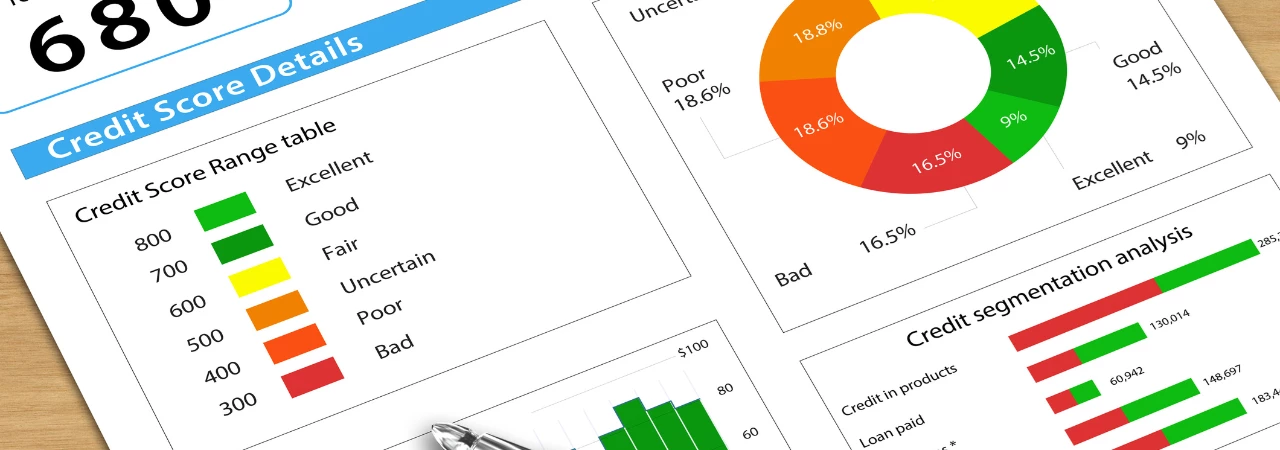February 6, 2025 | by Brian Truong

Earning & Maintaining Your Credit Score
October 31, 2022
By Chad Carpenter
 A high credit score should be a prioritized financial goal because it directly influences your journey to financial wellness. From credit cards to home ownership, a healthy credit score empowers you to have the best options to achieve your overall life goals.
A high credit score should be a prioritized financial goal because it directly influences your journey to financial wellness. From credit cards to home ownership, a healthy credit score empowers you to have the best options to achieve your overall life goals.
In general, FICO scores range from 300 to 850, with a good credit score starting from 670 and increasing up to 850, which is considered excellent. By establishing good habits and managing your credit responsibly, you can earn a high score and maintain it consistently to set yourself up for success.
In today's article, we're going to discuss several ways you can achieve and maintain a higher credit score which will impact your financial future.
Managing Monthly Bills & Payments
Paying your bills on time shows lenders that you're a trustworthy borrower in the long run. Lenders use FICO scores to gauge your loan eligibility and interest rates. This means that your reliability to make payments and your payment history come into question. The most common loan payments that help build up your credit include credit card bills, car loans, and mortgages.
However, you can also get a boost to your credit through your monthly household bills, such as rent and utilities, when your payment activity is reported to the credit bureau. Paying these expenses on time establishes a positive payment history, enhancing your credit score. You can set up automatic payments or due date alerts to avoid missing a payment. If you manually manage your bill payments, set reminders on your calendar a week ahead of your due dates and maintain a filing system to easily retrieve them for payment.
Pay Down Revolving Credit Balance
Revolving credit is a good tool as you can repeatedly borrow against a line of credit. However, exceeding your revolving credit balances against your credit limit, or always maintaining a maxed-out limit, will damage your credit score. The key is to pay off your revolving credit balances on time with more than the minimum payment, if possible, lowering your credit utilization rate and improving your credit score.
Your credit utilization rate is the amount of revolving credit that you are using divided by your revolving credit limit. Ideally, the total balances in your credit cards or lines of credit should not exceed 30% (credit utilization rate) of your total available credit limit. To put this in simple numbers, if your credit card offers a $10,000 credit limit, you should try to keep your balance under $3,000 at any given point. If your expenses push you over this limit, make sure to pay down your balance as quickly as possible.
Don't Be Afraid to Use Your Credit Responsibly
 Many people still believe that credit cards are a quick way to ruin your credit or put you on the road to mountains of debt. But with responsible spending habits, utilizing credit cards can help boost your credit score over time. According to Experian's State of Credit Report, in 2022, Gen Z has lower credit utilization and a minimized number of missed payments compared to 2021. This means the average consumer is likely in the know about responsible spending habits.
Many people still believe that credit cards are a quick way to ruin your credit or put you on the road to mountains of debt. But with responsible spending habits, utilizing credit cards can help boost your credit score over time. According to Experian's State of Credit Report, in 2022, Gen Z has lower credit utilization and a minimized number of missed payments compared to 2021. This means the average consumer is likely in the know about responsible spending habits.
Even so, it is fair to say that getting into the normal habit of swiping your credit card to pay for items outside your budget can lead to reckless spending, which affects your credit score. To counter this, you can charge small essential expenses such as gas or groceries, which you can afford to pay off quickly each month.
For example, you could use a credit card instead of a debit card when buying gas at the pump. Then, after you're done filling your tank, you could utilize online banking or your mobile banking app to immediately transfer funds from your savings or checking account toward your credit card as payment. By doing so, you'll gain the benefits of utilizing your credit in a positive way and will reduce the risk of forgetting a payment.
Another option is to fully pay off your credit card weekly instead of monthly. By setting a payment day each week, like every Saturday for example, you'll be able to track your spending toward your budget much more effectively while ensuring your balance never gets too out of hand. Gradually, necessary purchases will boost your payment history, strengthening your credit scores.
Limit New Account Applications
If you're thinking of opening a new account, keep in mind how it may affect your credit score. When you submit your application for an account, such as a credit card or line of credit, the lender will make a hard inquiry into your credit history. Hard inquiries involve pulling your credit report from either TransUnion, Experian, or Equifax, which are the three main credit bureaus. If you have more than two hard inquiries on your report, it can cause your credit score to drop slightly as it shows you're looking to take on new debt and haven't yet proven if you can pay the amount owed.
As mentioned above, another reason for the fluctuating credit score is the impact of the balance on your credit utilization rate. Remember, the more the credit balance, the higher the utilization rate (above 30%), which negatively impacts your credit.
New credit lines will also adjust the "average age" of your overall accounts. Building good credit takes time and commitment, which increases your credit age. Your credit age accounts for 15% of your total credit scores. If, for example, you keep a credit line for 20 years without late or missed payments, it reveals you can responsibly manage credit and are a safe bet for lenders to trust you with credit cards and loans.
When you add a new line of credit, the average age drops to 10 years. Take note that the average age of accounts is not significant in determining credit scores but adding new accounts within a short time will potentially lower your credit scores.
Be Patient & Diligent
 When it comes to building and maintaining positive credit, patience is key. You also need time, as it takes at least three to six months to reach a good credit score and years of consistent and positive credit activity to achieve an excellent score. While this fact shouldn't scare you away from starting your journey to a healthier credit score, it does mean that the sooner you start, the better.
When it comes to building and maintaining positive credit, patience is key. You also need time, as it takes at least three to six months to reach a good credit score and years of consistent and positive credit activity to achieve an excellent score. While this fact shouldn't scare you away from starting your journey to a healthier credit score, it does mean that the sooner you start, the better.
It's important to note that lenders rely on your FICO scores to determine your eligibility for credit or a loan. FICO scores take into account your payment history (35%), amounts you owe (30%), length of your credit history (15%), credit mix (10%), and new credit (10%). Because your FICO score tells lenders what risk they are taking to lend to you, managing the factors for the score's calculation will directly impact your borrowing power.
If you want to earn and retain excellent credit, you can adopt a few habits over time. As we've discussed, one of them is making payments on time, as late payments can significantly dent your credit score and reflect on your credit report for up to 7 years.
Staying below your credit limit is also wise, as it lowers your credit utilization rate. If you stick to spending on essential purchases, this will avoid the struggle to pay the balances every month.
Make another habit of frequently double-checking your credit reports for accuracy so you can catch any errors that may hurt your credit scores. You can retrieve a free credit report from each of the three main credit bureaus.
Also, try to pay more than the minimum amount, reducing your debt faster and lowering your credit utilization rate.
As soon as you embrace these practices, your credit card use will transform from a potential risk to a resourceful tool used to help build your financial well-being. Also, if you have a setback and need to rebuild your credit, you will have the tools you need to get back on the right track.
Key Takeaway
Smart credit use plus time and patience are major ingredients for a high credit score. By establishing good habits based on the tips above, you can reap some amazing benefits, such as lower interest rates on loans and credit cards and higher approved credit limits for larger purchases in the future.
Chad Carpenter hails from Dallas, Texas, and lived in Denver, Colorado, for 15 years before landing in Houston. Chad has over 20 years of marketing and SEO experience, including several years in the agency world. When he’s not clacking away on his keyboard optimizing Wellby's digital presence, digging into data, or immersed in AI, Chad enjoys good food, good friends, and good movies (just don’t expect him to watch any in interactive 4D). Chad has two cats, one that loves him and one who is aloof.
Related articles you might like
December 23, 2024 | by Brian Truong
Budgeting 101: Comparing Fixed and Variable Costs
December 12, 2024 | by Brian Truong







